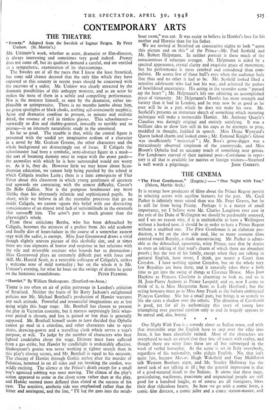"Hamlet." By William Shakespeare. (Stratford-on-Avon.) THERE is too often an
air of polite patronage in London's criticism of Stratford. Neither the fruits of Sir Barry Jackson's enlightened policies nor Mr. Michael Benthall's production of Hamlet warrants any such attitude. Powerful and resourceful imaginations are at last using aright this huge stage. Mr. Benthall has chosen to present the play in Victorian costume, but it matters surprisingly little what- ever period is chosen, and less is gained or lost than is generally supposed. Mr. Benthall himself seems to have decided that Ophelia cannot go mad in a crinoline, and other characters take to open shirts, dressing-gowns and a travelling cloak which serves a toga's Purpose, at will. To judge by the number of characters who bear lighted candelabra about the stage Elsinore must have suffered from a gas strike, but Hamlet by candlelight is undeniably effective. Shakespeare's genius was nevet working at tighter stretch than in this play's closing scenes, and Mr. Benthall is equal to his occasion. The chasing of Hamlet through Gothic arches after the murder of Polonius, hemmed in on all sides and yet breaking the cordon, was wildly exciting. The silence at the Prince's death except for a small boy's agonised sobbing was most moving. The climax of the play's action appeared to come in the closet scene rather than at the play, and Hamlet seemed more deflated than elated at the success of his ruse. The sensitive, aesthetic side was emphasised rather than the bitter and astringent, and the line, "I'll lug the guts into the neigh-
hour room," was cut. It was easier to believe in Hamlet's love for his mother and Horatio than for his father.
We are invited at Stratford on consecutive nights to look "upon this picture and on this" of the Prince—Mr. Paul Scofield and Mr. Robert Helpmann. In neither portrait is there much of the conscientious if reluctant avenger. Mr. Helpmann is aided by a spectral appearance, crystal clarity and exquisite grace of movement, but his performance is more cerebral and considered than com- pulsive. He scores few of those bull's eyes when the audience feels that thus and no other it had to be. Mr. Scofield looked liked a sensitive adolescent who had lost his way, and achieved the pathos of bewildered uncertainty. His acting in the recorder scene "pursed _up the heart " ; Mr. Helpmann's left one admiring an accomplished piece of virtuosity. Mr. Helpmann's Hamlet has more strength and variety than it had in London, and he may now be as good as he ever will be in a part which he does not make his own. Mr. Scofield's presents an immature sketch of something which maturing technique will make a memorable Hamlet. Mr. Anthony Quayle's Claudius was daringly original and entirely satisfying. It was a brilliant idea to show him still in his cups as he attempts to pray, muddled in thought, fuddled in speech. Miss Diana Wynyard's Queen lacked charm and looked cross ; Mr. Esmond Knight's Ghost was insufficiently " majestical " ; Mr. Bass's grave-digger was a miraculously observed simpleton of the countryside, and Miss Bloom's Ophelia had an uncanny touch of something near genius. For Londoners starved of their national poet--Coriolanus in reper- tory is all that is available for natives or foreign visitors—Stratford






























 Previous page
Previous page